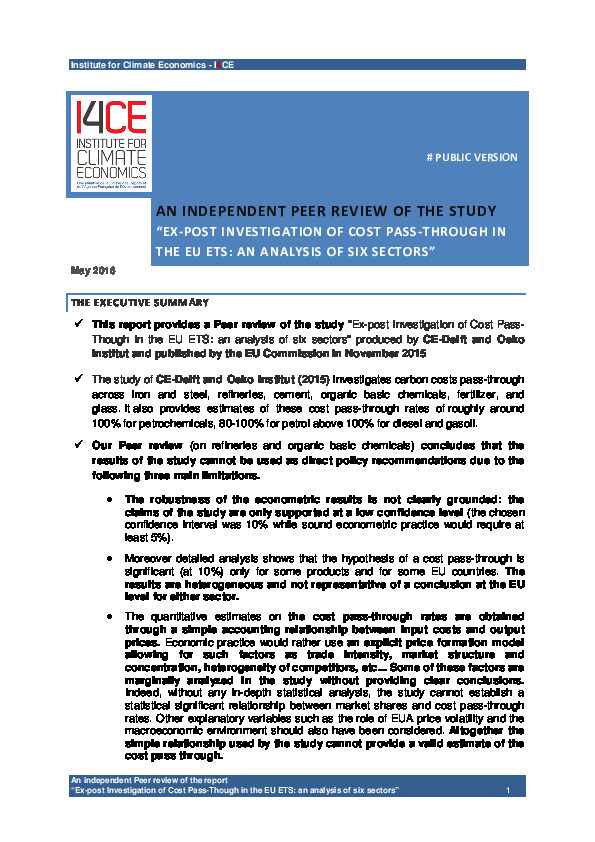An independent Peer review of the study “Ex-post Investigation of Cost Pass-Through in the EU ETS: an analysis of six sectors”
This I4CE report provides a peer review of the study “Ex-post Investigation of Cost Pass-Though in the EU ETS: an analysis of six sectors” produced by CE-Delft and Oeko Institut and published by the EU Commission in November 2015.
In the discussion on the potential risk of carbon leakage related to the EU ETS and the effect of safeguard measures, the scope for passing through carbon costs in final product prices is deemed a key issue. This study of CE-Delft and Oeko Institut (2015) investigates whether and to what extent ETS-related carbon costs have indeed been passed through into product prices by EU industry across iron and steel, refineries, cement, organic basic chemicals, fertilizer, and glass.
The peer-review of the CE-Delft and Oeko Institut study is produced by I4CE on the basis of the three academic peer reviews mandated by I4CE.
The I4CE Peer review, focused on two only sectors: refineries and basic organic chemicals. concludes that the results of the study cannot be used as direct policy recommendations due to the following three main limitations.
- The robustness of the econometric results is not clearly grounded: the claims of the study are only supported at a low confidence level (the chosen confidence interval was 10% while sound econometric practice would require at least 5%).
- Moreover, detailed analysis shows that the hypothesis of a cost pass-through is significant (at 10%) only for some products and for some EU countries. The results are heterogeneous and not representative of a conclusion at the EU level for either sector.
- The quantitative estimates on the cost pass-through rates are obtained through a simple accounting relationship between input costs and output prices. Economic practice would rather use an explicit price formation model allowing for such factors as trade intensity, market structure and concentration, heterogeneity of competitors, etc… Some of these factors are marginally analyzed in the study without providing clear conclusions. Indeed, without any in-depth statistical analysis, the study cannot establish a statistical significant relationship between market shares and cost pass-through rates. Other explanatory variables such as the role of EUA price volatility and the macroeconomic environment should also have been considered. Altogether the simple relationship used by the study cannot provide a valid estimate of the cost pass through.
